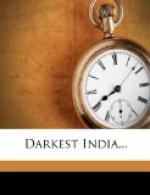CATHOLICITY—SOCIAL AND RELIGIOUS.
Another distinctive characteristic of this book is its extraordinary catholicity. In this respect I know no book like it that has appeared in our time. While declaring with passionate conviction the truth and necessity of the gospel which the Salvation Army preaches, there is not one word of intolerance from the first page to the last. It is easy to be broad when there is no intensity of conviction. The liberality of indifference is one of the most familiar phenomena of the day. But General Booth is broad without being shallow, and his liberalism certainly cannot be attributed to indifference! He is as earnest as John the Baptist, for now and then the aboriginal preacher reappears crying aloud, Jonah-like, messages calling men to flee from the wrath to come. But no broad churchman of our time, from Dean Stanley downwards, could display a more catholic spirit to all fellow workers in the great harvest field, which is white unto the harvest, but where the labourers are so few. This spirit he displays not only in the religious field, but what is still more remarkable, he carries it into the domain of social experiment. The old intolerance and fierce hatred which raged in the churches at many great crises in the history of the world is with us still, but it is no longer in religious dress. The rival sects of socialists hate each other and contend with each other with a savagery which recalls the worst days of the early church. Every man has got his own favourite short cut to Utopia and he damns all those who do not work therein with the unhesitating assurance of an Athanasius. Hence catholicity is much more needed and much more rarely found in the domain of social economics than in that of religious polemices. General Booth as befits a practical man is supremely indifferent to any particular fad, and constructs his scheme on the principle of selecting every proposal which seems to have stuff in it, or is calculated to do any good to suffering humanity. The socialist, the individualist, the political economist, the advocate of emigration, and all social reformers will find what is best in their own particular schemes incorporated in General Booth’s schemes. He claims no originality, he disclaims all prejudice even in favour of his own scheme. His suggestions, he says, seem for the moment the most practicable, but he is ready, he tells us with uncompromising frankness, to abandon them to-morrow if any one can show him a better way.




